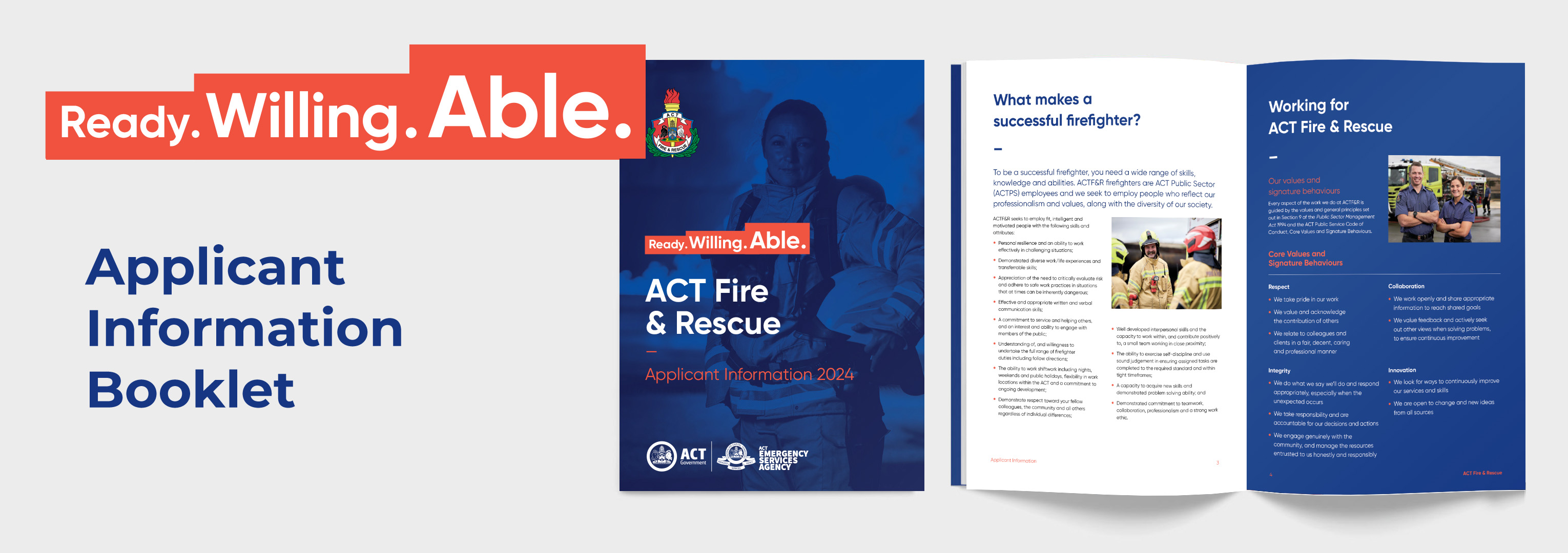Being a firefighter is no ordinary job. The work is varied, challenging and rewarding.
The information provided on this webpage will help you to better understand the role of a firefighter, the key requirements of the role and outline the recruitment process. We encourage all women and men to use this information to prepare for the recruitment process and to maximise your potential for successful employment.
Applications for the 2026 recruitment campaign are likely to open approximately mid year. Please monitor this website and social media pages to stay up to date. If you are unable to find the answer you are looking for in the information provided on this site please email: actfr_recruitment@act.gov.au.
Watch: Pre-recorded Career Information Session
Watch: Step-by-step guides for the Physical Aptitude Test (PAT)
ACT Fire & Rescue does not endorse any providers or individuals who advertise to assist candidates in any way, during recruitment processes. ACT Fire & Rescue does not endorse payment of such services.
Any applicant who engages with such providers for any services relating to recruitment, does in no way gain any advantage over applicants who do not engage such services.
ACT Fire & Rescue (ACTF&R) works to protect life, property and the environment in the Australian Capital Territory (ACT).
ACTF&R has a long tradition of excellence in the protection of life, property and the environment of the ACT community and surrounding area. ACTF&R is made up of over 370 permanent firefighters, support staff, and over 500 community fire unit (CFU) volunteers.
We manage and respond to emergencies including:
- Structure Fires
- Bush and Grass Fires
- Vehicle Fires
- Motor Vehicle Accidents
- Automatic Fire Alarms
- Hazardous Material Incidents
- Confined Space Rescues
- Trench Rescues
- Urban Search and Rescue Operations
- Animal Rescues
- Vertical Rescues
We work with other emergency services to provide:
- Medical Assist Responses
- Storm Damage Mitigation
Being a firefighter is no ordinary job. The work is varied, challenging and rewarding. In addition to responding to emergencies, a firefighter’s role entails a range of functions including:
- Fire prevention and investigation;
- Community education and activities related to safety and prevention, including fire education for children (conducted in pre-schools, kindergartens, primary schools); working with diverse communities to raise awareness, educate and help minimise the impact of fire; and, providing assistance to the elderly, e.g. installation of smoke alarms in homes;
- Ensuring compliance with fire safety regulations during building approvals;
- Carrying out building inspections to prepare risk assessments and pre-incident plans;
- Attendance at fetes and other community events;
- The provision of emergency safety information to specific neighbourhoods or areas;
- Inspecting and assessing potential fire hazards;
- Pre planning for incidents involving specific hazards, risks or events;
- Scrutinising plans for proposed suburban developments to ensure safety of residents from bush and grass fire;
- Undertaking ongoing development and maintenance of skills and knowledge through regular training and study; and
- Cleaning/maintenance of equipment, fire station and appliances. This includes core housekeeping duties such as cleaning the bathroom, kitchen, vacuuming etc.
Firefighters often operate in challenging situations, including when people are injured or deceased.
When attending incidents, firefighters will be required to comfort victims and provide first aid until the arrival of the ACT Ambulance Service (ACTAS). Firefighting is physically and psychologically demanding, especially during major emergencies.
It also involves quick thinking, team work and physical and mental endurance.
Generally, career firefighters work in a fire station in a crew supervised by a Station Officer. Several stations are ESA shared facilities with other emergency services. ACTF&R have fire stations strategically located around the ACT to enable quick response to incidents. We also staff an emergency communications centre.
To provide our emergency services on a 24/7 basis ACTF&R has four shifts (known as A, B, C & D Platoons). You will be transferred to a Platoon at a fire station following satisfactory completion of recruit training with future rotation opportunities.
Firefighters are required to maintain good health and physical fitness.
To be a successful firefighter, you need a wide range of skills, knowledge and abilities. ACTF&R firefighters are ACT Public Sector (ACTPS) employees and we seek to employ people who reflect our professionalism and values, along with the diversity of our society.
ACTF&R seeks to employ fit, intelligent and motivated people with the following skills and attributes:
- Personal resilience and an ability to work effectively in challenging situations;
- Demonstrated diverse work/life experiences and transferrable skills;
- Appreciation of the need to critically evaluate risk and adhere to safe work practices in situations that at times can be inherently dangerous;
- Effective and appropriate written and verbal communication skills;
- A commitment to service and helping others, and an interest and ability to engage with members of the public;
- Understanding of, and willingness to undertake the full range of firefighter duties including follow directions;
- The ability to work shiftwork including nights, weekends and public holidays, flexibility in work locations within the ACT and a commitment to ongoing development;
- Demonstrate respect toward your fellow colleagues, the community and all others regardless of individual differences;
- Well-developed interpersonal skills and the capacity to work within, and contribute positively to, a small high performing team working in close proximity;
- The ability to exercise self-discipline and use sound judgement in ensuring assigned tasks are completed to the required standard and within tight timeframes;
- A capacity to acquire new skills and demonstrated problem solving ability and
- Demonstrated commitment to teamwork, collaboration, professionalism and a strong work ethic.
Environments firefighters are required to work in include:
- Working at heights
- Working in enclosed spaces
- Working outdoors
- Working in situations where you may see seriously injured people and/or fatalities
- Working with a diverse range of people e.g. different ages, ethnic backgrounds etc.
- Carrying and operating equipment
- Working 10 or 14 hour shifts





